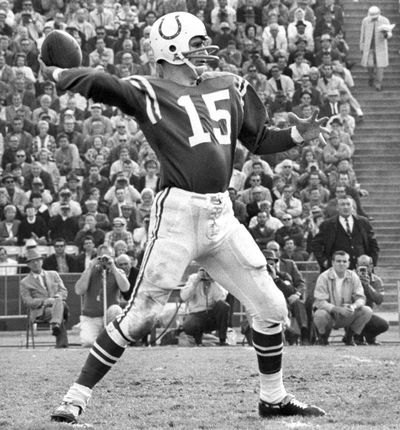Former NFL quarterback Earl Morrall dies at 79

MIAMI – Earl Morrall stepped in when the 1972 Miami Dolphins needed him most. And then he willingly stepped aside, earning enduring admiration from his teammates and coach Don Shula.
Morrall, who started 11 games during the Dolphins’ perfect season and spent 21 years as an NFL quarterback, died Friday at age 79. He had been in failing health for some time.
“There would be no perfect season, and probably no Super Bowl win in 1972, without Earl Morrall,” Bob Griese said Friday.
When Griese broke his ankle in 1972, Morrall came off the bench and started the final nine games of the regular season. Morrall won praise from Shula for returning to the sideline without complaint when Griese came back to play in the final two postseason games, including the Super Bowl to cap the only perfect season in NFL history.
Morrall also played for the 49ers, Steelers, Lions, Giants and Colts, winning three Super Bowl rings. He came off the bench to replace an injured Johnny Unitas and help the Colts win the Super Bowl to cap the 1970 season, and he was the backup to Griese on the Dolphins’ 1973 championship team.
Morrall also was the starting quarterback opposite Joe Namath in the 1969 Super Bowl after guiding the Colts to the conference title and winning the league’s MVP award. He struggled in that famous 16-7 loss to the Jets, throwing key interceptions, and was benched during the second half for Unitas.
The ’72 Dolphins were led by such future Pro Football Hall of Famers as Shula, Griese, Larry Csonka and Paul Warfield, but their season might be long forgotten if not for Morrall, then regarded as a journeyman who looked the part with his old-school flattop haircut.
That’s why Shula, who also coached Unitas and Dan Marino, held Morrall in special regard as a quarterback.
“When Bob went down, Earl stepped in like nothing happened, and we just won all the games,” Shula said in a 2007 interview. Griese said Morrall acknowledged he didn’t like Shula’s decision, but accepted it.
“He said, ‘I don’t agree with you, but whatever you think is best for the team, I’ll go along with it,’ ” Griese said. “That’s the way Earl was throughout his career.
“He always had a smile, a good word, a pat on the back, whether he knew you or didn’t.”
Morrall was a Michigan native who played at Michigan State. He led the Spartans to two Rose Bowl wins, and was an infielder in the 1954 College World Series.